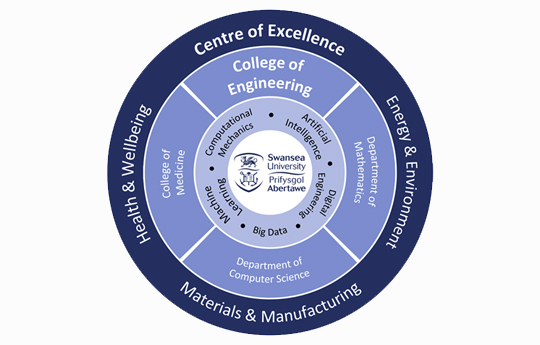The digital revolution offers an exciting opportunity to disrupt the engineering sector. There is a need to develop a national Data-Driven Engineering Design capability to bridge the Technology Readiness Level (TRL) gap across applications that are notoriously difficult and expensive to prototype. This will require a multidisciplinary community from industry and academia to bridge the disciplines of the AI, HPC and Industry 4.0 technologies.
Our goal is to establish a platform, which leads to systems and processes that are designed for data, and designed by data. To do this, the design process must be turned on its head, it is no longer appropriate for designers to focus solely on the operational use as optimisation targets. As part of a circular economy, usage and monitoring across entire life-cycles must be the cornerstone of development.
Current practice is to base design for systems and processes on computational modelling or simulation that emulates expected utilisation scenarios to evaluate predicted performance. Research in this centre of excellence will pursue an approach that focuses on data-based outcomes to project backwards how systems and processes should be utilised in order to inform optimal design.
We will investigate topics such as:
- Optimisation of data collection
- Predictive monitoring of complex systems
- Real-time simulation
- Handling of anomalies and extreme events
- Automation with ML from real-world data
- Computer vision informed models
- Measured and simulated data-driven design of additive manufactured materials

Apply for a Studentship
We are calling for applications for 3-year fully funded and industrially sponsored research studentships as part of a new exciting initiative at Swansea University. Join us and be part of a new generation of engineers developing this data-driven approach to tackle some of the world’s most challenging problems.
From innovating to mitigate climate change and meet associated challenges, to next-generation medical imaging systems to making a step-change in smart and/or autonomous systems to developing the next generation of methods to address these challenges.
The first cohort of students will focus their research on the following topics:
Topic #1 Aerospace Engineering and Structures
Topic #2 Biomedical Engineering
Topic #3 Energy and Environment
Topic #4 Computational Methods in Engineering
Topic #5 Solids, Structures and Coupled Systems
Topic #6 Future Manufacturing Technologies
To apply, please email your application to ADDED@swansea.ac.uk.
Your application must include the following attachments in pdf form:
- CV
- A statement no longer than 2 pages of A4 in length that explains why you want to join our Centre, what you will bring to our community and which of our challenging contexts that particularly appeal to you. You should highlight relevant parts of your background you believe make you suitable for a PhD in Data-Driven Engineering Design. You do not need to specify a detailed research plan.
This training programme will offer an unparalleled opportunity to develop your skills in areas vital to Advanced Data-Driven Engineering Design. These include topics, such as: Big Data; Machine Learning; High-Performance Computing; Leading Edge Engineering Simulation of Systems and Processes; Advanced Computational Mechanics and Fluids and Additive Manufacturing, all of which are highly in demand by our industrial partners, thus putting you at the forefront of employability.
The successful candidate will have a good undergraduate degree in a relevant subject, e.g. engineering, materials science, physics, computer science or mathematics. Previous specialisation in data-driven engineering is not required as the student will gain this expertise during their studies in addition to valuable transferable skills ensuring the candidate is prepared for a wide range of possible career paths after graduation.


